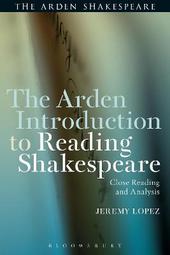
|
The Arden Introduction to Reading Shakespeare: Close Reading and Analysis
Hardback
Main Details
| Title |
The Arden Introduction to Reading Shakespeare: Close Reading and Analysis
|
| Authors and Contributors |
By (author) Jeremy Lopez
|
| Physical Properties |
| Format:Hardback | | Pages:176 | | Dimensions(mm): Height 216,Width 138 |
|
| ISBN/Barcode |
9781472581044
|
| Classifications | Dewey:822.33 |
|---|
| Audience | | Tertiary Education (US: College) | | Professional & Vocational | |
|---|
|
Publishing Details |
| Publisher |
Bloomsbury Publishing PLC
|
| Imprint |
The Arden Shakespeare
|
| Publication Date |
20 September 2018 |
| Publication Country |
United Kingdom
|
Description
Shakespeare's plays are works of art made out of words. To read the plays closely, that is, to pay careful attention to the multiple, shifting meanings of and relationships between their words, is to gain a deep and lasting appreciation for the complex artistry of their construction and of their effects. In fourteen chapters, the book takes readers on a guided tour through some of the most productive sites in Shakespeare's plays for analysis, providing an introduction to the practice of reading Shakespeare's plays closely, and some examples of the interpretive work that such close reading can enable. Topics of analysis include verbal patterning, dramatic structure, staging and stage directions, soliloquies and character-construction and poetic meter. This is an ideal teaching text for introductory courses on Shakespeare. Offering a wide range of examples from nearly all of Shakespeare's plays, it will give students the analytical tools they need to develop sustained close readings of their own.
Author Biography
Jeremy Lopez is Professor of English at the University of Toronto, and the Editor of Shakespeare Quarterly.
ReviewsJeremy Lopez's Arden Introduction to Reading Shakespeare succeeds brilliantly as an Introduction for students - to every conceivable element of a play, from "The Title" to "Last Words," with topics in between as diverse and as essential as "Stage Directions" and "Patterned Language." The kinds of questions he poses for students will be of interest to - and adopted by - even the most experienced teachers, as he models a way of thinking about literature. And for specialists in the period, his own illustrative close readings are compelling and provocative. Lopez has created a wonderfully useful book. -- William C. Carroll - Boston University, USA
|